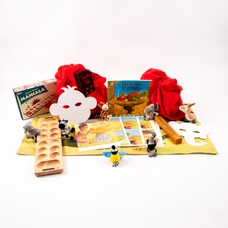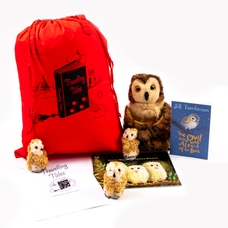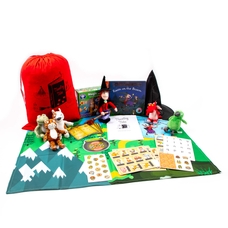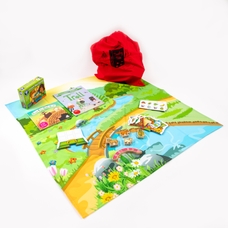Travelling Tales - Lifecycle of a Caterpillar from Hope Education KIT
Travelling Tales - Lifecycle of a Caterpillar from Hope Education KIT
Product code: ADMT15057
Product Description
Eric Carle's The Very Hungry Caterpillar is a classic tale, well known to parents and children alike. As the Hungry Caterpillar emerges from his egg, and makes his way through the week, children can follow his colourful and engaging journey.
Travelling Tales from Hope Education provides everything you need to tell the story of the Very Hungry Caterpillar and build a variety of cross-curricular lessons. The pack also includes a printed mat that links to the story, a non-fiction book about flowers and butterflies, a fun game and Insects TOOB® containing an assortment of creepy crawlies that little ones are sure to recognise from their own outdoor adventures.
The handy teacher’s guide offers a variety of lesson starters and ideas to help build lessons for children in nursery and up.
- Using the printed story mat and the puppet, children can retell the story. Reinforcing the days of the week, early numeracy and sequencing, as well as supporting early literacy skills.
- Inject fun with the Mini Bugs Bingo game included. This will help to develop observational, social and memory skills.
- Bring Science to life and study the lifecycle of caterpillars with the non-fiction book.
- Teach a series of quality literacy lessons using a range of cross-curricular resources and the Teacher Guide for inspiration.
What’s in the Travelling Tales sack?
- 1 x copy of The Very Hungry Caterpillar picture book & CD
- 1 x Insects and Spiders Mini Animals - Pack of 12
- 1 x Little Bugs Bingo game
- 1 x Non-fiction book
- 1 x printed story mat
- 1 x Teacher Guide
Contents may vary from description.
- Quality texts from well-known authors, great for sharing with children; the patterned language promotes choral reading and retelling, naturally encouraging audience participation!
- Each bag provides a window into a new world where the children can learn new ideas and information through engaging and exciting stories
- Good quality materials support the texts, allowing children to create their own play with the characters, further developing vocabulary and language
- Each bag contains a related non-fiction text, developing the idea of the story with further information. The games link to the text and provide the opportunity to work collaboratively and take turns, while extending and developing the story
- EYFS Communication and Language and Understanding
- After listening to stories, children can express views about events or characters in the story and answer questions about why things happened. Expressive arts and design
- This involves supporting children to explore and play with a wide range of media and materials. It involves providing children with opportunities and encouragement for sharing their thoughts, ideas and feelings through a variety of activities including role-play. Being imaginative:
- Children use what they have learnt about media and materials in original ways, thinking about uses and purposes
- They represent their own ideas, thoughts and feelings through … role-play and stories Letters and Sounds - Phase 1: Enjoying and sharing books
- Experience shows that children benefit hugely by exposure to books from an early age. Right from the start, lots of opportunities should be provided for children to engage with books that fire their imagination and interest. They should be encouraged to choose and peruse books freely as well as sharing them when read by an adult. Enjoying and sharing books leads to children seeing them as a source of pleasure and interest and motivates them to value reading. Spoken language
- The National Curriculum for English reflects the importance of spoken language in pupils’ development across the whole curriculum – cognitively, socially and linguistically. Spoken language underpins the development of reading and writing. The quality and variety of language that pupils hear and speak are vital for developing their vocabulary and grammar and their understanding for reading and writing. Pupils should develop a capacity to explain their understanding of books and other reading, and to prepare their ideas before they write.
- Pupils should be able to adopt, create and sustain a range of roles, responding appropriately to others in role. They should have opportunities to improvise, devise and script drama for one another and a range of audiences, as well as to rehearse, refine, share and respond thoughtfully to drama and theatre performances. Reading
- Good comprehension draws from linguistic knowledge (in particular of vocabulary and grammar) and on knowledge of the world. Comprehension skills develop through pupils’ experience of high-quality discussion with the teacher, as well as from reading and discussing a range of stories, poems and non-fiction. All pupils must be encouraged to read widely across both fiction and non-fiction to develop their knowledge of themselves and the world in which they live, to establish an appreciation and love of reading, and to gain knowledge across the curriculum.
- Reading widely and often increases pupils’ vocabulary because they encounter words they would rarely hear or use in everyday speech. Reading also feeds pupils’ imagination and opens up a treasure-house of wonder and joy for curious young
- This popular book is available in 3 dual language versions to use alongside your Travelling Tale Set!
Further Information
- Age Recommended from
- 3 Years
- Age Suitable from
- 3 Years
- Brand
- Travelling Tales
- EYFS Aim
- Communication & Language: Literacy
- Genre
- Popular Stories
- Key Stage
- EYFSKey Stage 1
- Primary Learning Outcome
- Reading Comprehension; Spoken Language
- Product Type
- Story Sacks
Eric Carle's The Very Hungry Caterpillar is a classic tale, well known to parents and children alike. As the Hungry Caterpillar emerges from his egg, and makes his way through the week, children can follow his colourful and engaging journey.
Travelling Tales from Hope Education provides everything you need to tell the story of the Very Hungry Caterpillar and build a variety of cross-curricular lessons. The pack also includes a printed mat that links to the story, a non-fiction book about flowers and butterflies, a fun game and Insects TOOB® containing an assortment of creepy crawlies that little ones are sure to recognise from their own outdoor adventures.
The handy teacher’s guide offers a variety of lesson starters and ideas to help build lessons for children in nursery and up.
- Using the printed story mat and the puppet, children can retell the story. Reinforcing the days of the week, early numeracy and sequencing, as well as supporting early literacy skills.
- Inject fun with the Mini Bugs Bingo game included. This will help to develop observational, social and memory skills.
- Bring Science to life and study the lifecycle of caterpillars with the non-fiction book.
- Teach a series of quality literacy lessons using a range of cross-curricular resources and the Teacher Guide for inspiration.
What’s in the Travelling Tales sack?
- 1 x copy of The Very Hungry Caterpillar picture book & CD
- 1 x Insects and Spiders Mini Animals - Pack of 12
- 1 x Little Bugs Bingo game
- 1 x Non-fiction book
- 1 x printed story mat
- 1 x Teacher Guide
Contents may vary from description.
- Quality texts from well-known authors, great for sharing with children; the patterned language promotes choral reading and retelling, naturally encouraging audience participation!
- Each bag provides a window into a new world where the children can learn new ideas and information through engaging and exciting stories
- Good quality materials support the texts, allowing children to create their own play with the characters, further developing vocabulary and language
- Each bag contains a related non-fiction text, developing the idea of the story with further information. The games link to the text and provide the opportunity to work collaboratively and take turns, while extending and developing the story
- EYFS Communication and Language and Understanding
- After listening to stories, children can express views about events or characters in the story and answer questions about why things happened. Expressive arts and design
- This involves supporting children to explore and play with a wide range of media and materials. It involves providing children with opportunities and encouragement for sharing their thoughts, ideas and feelings through a variety of activities including role-play. Being imaginative:
- Children use what they have learnt about media and materials in original ways, thinking about uses and purposes
- They represent their own ideas, thoughts and feelings through … role-play and stories Letters and Sounds - Phase 1: Enjoying and sharing books
- Experience shows that children benefit hugely by exposure to books from an early age. Right from the start, lots of opportunities should be provided for children to engage with books that fire their imagination and interest. They should be encouraged to choose and peruse books freely as well as sharing them when read by an adult. Enjoying and sharing books leads to children seeing them as a source of pleasure and interest and motivates them to value reading. Spoken language
- The National Curriculum for English reflects the importance of spoken language in pupils’ development across the whole curriculum – cognitively, socially and linguistically. Spoken language underpins the development of reading and writing. The quality and variety of language that pupils hear and speak are vital for developing their vocabulary and grammar and their understanding for reading and writing. Pupils should develop a capacity to explain their understanding of books and other reading, and to prepare their ideas before they write.
- Pupils should be able to adopt, create and sustain a range of roles, responding appropriately to others in role. They should have opportunities to improvise, devise and script drama for one another and a range of audiences, as well as to rehearse, refine, share and respond thoughtfully to drama and theatre performances. Reading
- Good comprehension draws from linguistic knowledge (in particular of vocabulary and grammar) and on knowledge of the world. Comprehension skills develop through pupils’ experience of high-quality discussion with the teacher, as well as from reading and discussing a range of stories, poems and non-fiction. All pupils must be encouraged to read widely across both fiction and non-fiction to develop their knowledge of themselves and the world in which they live, to establish an appreciation and love of reading, and to gain knowledge across the curriculum.
- Reading widely and often increases pupils’ vocabulary because they encounter words they would rarely hear or use in everyday speech. Reading also feeds pupils’ imagination and opens up a treasure-house of wonder and joy for curious young
- This popular book is available in 3 dual language versions to use alongside your Travelling Tale Set!
Further Information
- Age Recommended from
- 3 Years
- Age Suitable from
- 3 Years
- Brand
- Travelling Tales
- EYFS Aim
- Communication & Language: Literacy
- Genre
- Popular Stories
- Key Stage
- EYFSKey Stage 1
- Primary Learning Outcome
- Reading Comprehension; Spoken Language
- Product Type
- Story Sacks








